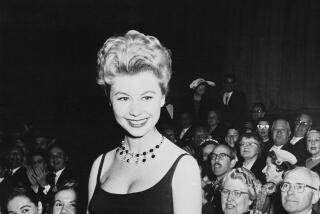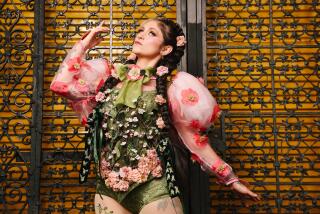Eartha Kitt: A ‘50s Favorite Still Has a Lot to Say
- Share via
“I’ve got 77 acres on my place here, and one of these days I’m going to plant them all in cotton so I can hire my old agents to come and pick it.”
As playfully kittenish as ever, still disguising her razor-sharp wit with velvet tones and smoldering glances, Eartha Kitt was only partially kidding. Giggling playfully over the phone line from Connecticut last week, she couldn’t help but take a quick swipe at the middlemen who, she feels, seem to think she’s either retired, out of the country, or dead.
Tonight, at the Hollywood Roosevelt Hotel’s Cinegrill, Kitt will open a two-week engagement that will no doubt prove she is none of the above.
“I think it’s a shame,” she said, “that those of us who have paid our dues from the beginning of time are not now being given a fair shake. I don’t know why agents don’t feel that my generation of performers is ‘commercial,’ whatever that means, but if you don’t make money--large sums of money--right away, they seem to feel that you’re just not going to be profitable enough for them.”
Kitt, who presumably turned 60 this year (there is no birth certificate from the South Carolina cotton plantation on which she was born), was one of the more fascinatingly provocative performers of the ‘50s. With hit records ranging from the purring “C’est Si Bon” and “Santa, Baby” to “Old-Fashioned Girl” and “Uska Dara,” she virtually defined the upscale sophistication of the period.
But the identification still irks her. “Oh, they told me that all the time--’You’re too sophisticated,’ ” she snorted. “I can remember a time when I was working the Plaza Hotel’s Persian Room, and then 10 days later I was booked into the Apollo Theatre in Harlem.
“My agents were the ones who said, ‘Eartha, if you go to the Apollo from the Persian Room, you’re going to have to change your act, because you’re too much above the heads of the people.’ Well, to me, that was an insult. And I did not change one thing. I went into the Apollo with exactly the same act I did at the Persian Room and people were standing in line from Eighth Avenue to Seventh Avenue trying to get into the place.”
It’s been 20 years since Kitt burst out of the entertainment pages and into the political world when she made an impassioned protest against the Vietnam War during a White House luncheon with Ladybird Johnson. It was the start of a long decline in her professional career--a decline she feels may have been directly related to her failure to be diplomatic with the President’s wife.
“Oh, yes,” she said, somewhat wearily, “even today, I’m told there are people who feel I was a bad girl for telling the truth. And because of it, they still consider me ‘difficult.’ But I was only being honest. I simply told Mrs. Johnson what I had been hearing from the boys who fled the country because they didn’t want to get involved with Vietnam.”
“Today, of course,” she chuckled, “everyone is honest. They go on the Oprah Winfrey show to be honest. But I’m the one who got slapped in the face for my honesty. And for years afterward, I couldn’t get work.”
Kitt’s suspicions received considerable verification in 1974, when columnist Jack Anderson reported that the CIA had accumulated a long dossier on her.
But Kitt’s politically active image, like the feline presence she brings to the stage, only represents an individual facet in a complex personality. She is also vulnerable (“I’m so shy at auditions; sometimes they make me want to cry”); physical (“I’m on the move all the time; if I’m not cleaning the house, I’m washing the windows”), and philosophical (“We are not taught to have self value. We are not taught that any kind of work is a respectable work to be doing. In my opinion, there’s no such thing as a meager job.”)
Her current plans call for the publication of a third autobiographical book, one which will “put back in all the stuff I had to take out of the last two. This time I’m going to tell everything that was done to me by men and agents over the years.”
And, most important of all, Kitt aims to continue to be at peace with herself. Describing a property she owns in the area, she said: “It’s right on the border, partially in Los Angeles, partially in Beverly Hills.” She laughed again: “It’s kind of like my whole life--on the border of something. I just haven’t figured out what , yet. But I am sure of this: Life is too great to fall apart.
“Being rich doesn’t have anything to do with money. I feel that I’m rich because my daughter Kit is a fantastic girl, I’m proud of myself as a mother, and I’m proud of myself as a person.
“Even if it is sometimes difficult for me to pay my bills, I can still look at myself in the mirror and say, ‘Eartha, you’re OK.’ ”
More to Read
Sign up for The Wild
We’ll help you find the best places to hike, bike and run, as well as the perfect silent spots for meditation and yoga.
You may occasionally receive promotional content from the Los Angeles Times.






